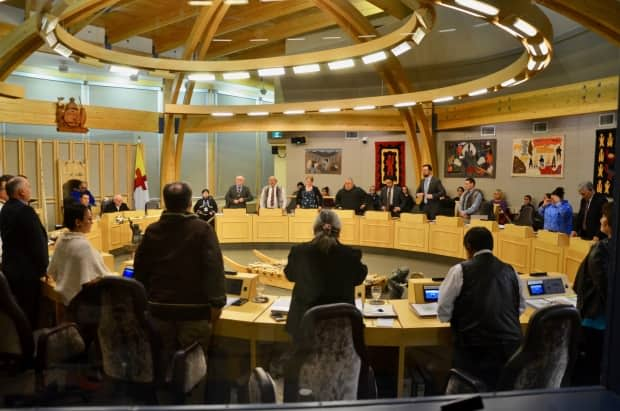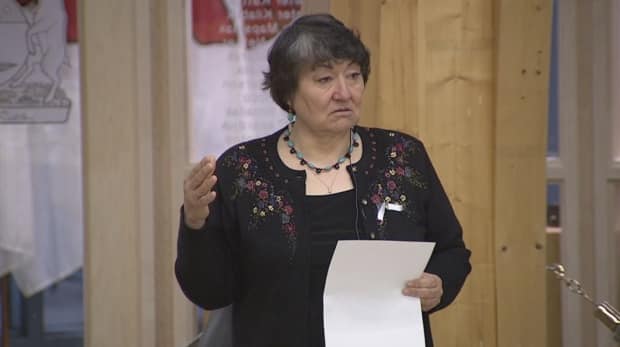Here's what Nunavut MLAs are focused on for spring sitting

For the first time since the birth of Nunavut, most regular MLAs will attend the spring sitting of the legislative assembly online and from their homes.
Government house leader Elisapee Sheutiapik said it's no surprise that the session, which begins Thursday, has gone online, after COVID-19 reached Iqaluit.
MLAs will be tackling at least eight bills, including an update of the Mental Health Act, reviews of financial assistance to Nunavut students, and a bill to improve Nunavut's regulatory powers over pension and benefits for employees.
Sheutiapik said she hopes for a smooth session, but knows they'll have to adapt the online proceedings to accommodate for slow Internet.
"We cannot really predict the service capabilities right now so if we must stop, we'll stop or postpone depending on the situation we get into," she said.
All cabinet ministers will be at the legislative assembly in Iqaluit, but 11 out of 13 regular members will do their work from their home communities.
It's one of the last opportunities for the assembly to complete its priorities under this government, with one more sitting in the second week of September, before the writ drops Sept. 20.
Amittuq MLA Joelie Kaernerk is one of two regular MLAs who will sit in the legislative assembly building for the spring sitting. He saw dropping COVID-19 case counts and decided to be in Iqaluit for the constituents of Amittuq. He wanted to ensure ministers would answer his questions face-to-face.
'No substitute for ... being in person'
During the last sitting, MLA for Arviat North-Whale Cove John Main, chair of the regular members' caucus, was the only MLA participating remotely.
This will be his second time conducting his political duties by Zoom.
"Due to the outbreak in Iqaluit, a large number of my colleagues will also be attending virtually. There is no question in my mind that technology has its drawbacks. There is just no substitute for actually being there in person," he said.

Main said that despite this, Nunavut MLAs will ask many questions about COVID-19 response, such as isolation hubs in Winnipeg and how much longer those will be in use.
Regular members are also likely to touch on vaccine passports, vaccine rollout for teenagers, and vaccine hesitancy among adults, said Main.
"This recent outbreak in Iqaluit just serves to underline the challenges that the government is facing, that the territory is facing, in dealing with the pandemic," he said.
8 bills to be reviewed
This sitting of the legislative assembly will see the review of eight bills, including the Mental Health Act.
"We had a very challenging year in Arviat and Whale Cove," said Main.

"It really, for me, highlighted some of the challenges that we have, and specifically I'm talking about the housing crisis, overcrowding and lack of access to housing," said Main.
He says there are "ongoing issues" such as health care staffing, and access to mental health services
"It's safe to say that not everyone has fully recovered yet from a quite traumatic and difficult situation," he said, of the spread of COVID-19 in communities.
'Very progressive' mental health legislation
Rankin Inlet and Chesterfield Inlet MLA Cathy Towtongie, who plans to join the sitting from her home community, said the Mental Health Act is welcome.
"It's very progressive, more progressive than other mental health acts in other jurisdictions," she said, adding it integrates Inuit Qaujimajatuqangit principles.
"Let's face it. We do have high cases of mental illness across Nunavut. It worries me that mental illness is … addressed through the courts. We are criminalizing mentally ill people and putting them in jails," she said.

The new act would ensure efforts are made to ensure a support person accompanies a police officer when it is safe and practical to do so, she said.
The act will ensure people who are struggling with their mental health can access supports who they recognize, rather than unfamiliar faces, such as social workers and RCMP.
Financial assistance for students
Towtongie said MLAs will also discuss Bill 73, which would review financial assistance to Nunavut students.
She said some students face financial difficulties, and some are going hungry.
Government house leader Elisapee Sheutiapik said there are some issues with loans that go back to the N.W.T. days, and those are being reviewed to meet the needs of students, she said.
When students get loans, depending on the criteria and grades, students can receive that money as a grant rather than a loan, she said.
The spring sitting of the legislative assembly starts at 1:30 p.m. on Thursday and will end on June 10.

